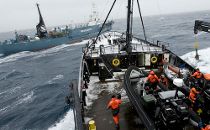Wikileaks exposes the last shocking cable
The unlikely pairing of the US and Japan has come to light this week, as Wikileaks exposed a potential deal between the two countries over Japan's commercial whaling.

The unlikely pairing of the US and Japan has come to light this week, as Wikileaks exposed a potential deal between the two countries over Japan's commercial whaling.
Wikileaks discovered that the US was trying to cut a deal with Japan, saying that it would investigate and act against international whaling activists if Japan greatly reduced its commercial whaling.
Four confidential cables between the US embassy in Tokyo and the state department in Washington DC show US and Japanese diplomats secretly trying to reach a deal ahead of International Whaling Commission (IWC) talks last year.
The American proposal would have forced Japan to reduce the number of whales that Japan killed each year in the Antarctic whale sanctuary, in return for the legal right to hunt other whales off its own coasts. In addition, the US proposed to ratify laws that would "guarantee security in the seas" – a reference against acting against groups that have physically tried to stop whaling.
In plans to stop activists, on November 2, 2009, Shuji Yamada, Japan's Vice Minister for International Affairs, asked lead US negotiator Monica Medina about an investigation of the tax affairs of Sea Shepherd Conservation Society (SSCS).
"Yamada inquired about an investigation into the tax status of the US-based NGO Sea Shepherd Conservation Society and repeated Japan's request for the US to take action against the organisation, which he said created a very dangerous situation on the seas," said one cable.
The SSCS is run by Captain Paul Watson, who is the co-founder of Greenpeace. Sea Shepherd have been physically confronting whalers, and following their every movement, stopping them from illegal fishing. They have been so successful that the number of whales killed annually by the Japanese has dropped dramatically.
The US dodged the question of a tax inquiry, but the cable continued by saying: "The DCM replied that the US places the highest priority on the safety of vessels and human life at sea, and added that if any violations of US law are discovered, we will take appropriate enforcement action."
The Japanese diplomats responded: "It would be easier for Japan to make progress in the IWC negotiations if the US were to take action against the Sea Shepherd."
The Japanese persisted, pressing the US to take action against the SSCS, saying that "violent protests by the Sea Shepherd Conservation Society (SSCS) could limit the government of Japan's flexibility in the negotiations."
From continued correspondence between the two countries, it seems that the US did look into the NGOs tax status, stating that the US government "can demonstrate the group [Sea Shepherd] does not deserve tax exempt status based on their aggressive and harmful actions."
At the IWC talks in June the US attempted to make a compromise with Japan, however the majority of countries rejected the idea.
In a statement made yesterday, about the latest from Wikileaks, Captain Watson said: "The US government may have very well looked into Sea Shepherd's activities and if they did so, then they obviously did not find any irregularities or unlawful activities because Sea Shepherd was never contacted by any US government official in connection with this matter.
"For Sea Shepherd, the most important part of this document is the declaration by Japan that Sea Shepherd has been responsible for the whaling fleet not reaching their quotas for the last few years. This completely validates Sea Shepherd's actions as effective."
Author: Charity Knight | Climate Action
Image: guano | flickr






